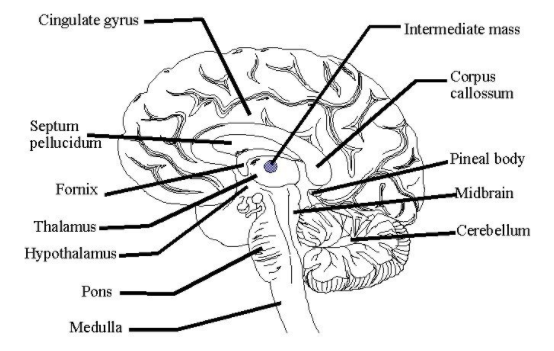
Draw a diagram of a vertical section of the human brain and label the following parts.
a) Cerebrum
b) Cerebellum
Answer
586.2k+ views
Hint: Human brain is the central organ or command center of the Humans nervous system, and it takes input from the all the sensory organs of the body and provide the output to the muscles, human brain is just like other mammals, they have a same basic structure, but the human brain is well developed than Other mammals brain.
Complete answer:
Generally, the weight of the adult human brain is in the range of 1 to 1.5 kg. The brain is mainly composed of neurons, and the neuron is the basic structural and functional unit of the nervous system. Approximately a brain contains 86 to 100 billion neurons.

Parts of the brain.
The brain is divided into mainly 3 parts, they are
- Forebrain: Cerebrum, hypothalamus, and thalamus.
- Midbrain: Tectum and Tegmentum.
- Hindbrain: Cerebellum, Medulla oblongata, and pons.
> Cerebrum: It is the largest part of the brain, and it consists of both the cerebral cortex and subordinate centers. It has two cerebral hemispheres, which are held together by a heavy band of dense fiber called corpus callosum.
They consist of four parts
- Frontal lobe: Mainly it is associated with the parts such as speech, movements, reasoning, planning and the problem solving.
- Parietal lobe: it mainly helps in movement, and the perception of stimuli.
- Occipital lobe: This part of the cerebrum is mainly involved in the visual processing.
- Temporal lobe: Involve in perception, Recognition of speech, and it also stimulates the speech, and auditory senses.
> Cerebellum: This is the second largest part of the brain, which is present posterior to the medulla and the Pons, and the cerebrum and cerebellum is divided by the cerebellar tentorium and transverse tissue.
- The outer surface of the cerebellum is called a cortex, where it has cerebellar peduncles, nucleus, and anterior and posterior lobes, and it is also divided into outer grey cortex and the inner white medulla.
- Main functions of the cerebellum include the equilibrium, coordinate system, body balance and posture, etc.
Note: Brain is enclosed in the skull, and it also suspended in the cerebrospinal fluid, which protects the brain from minor shocks and jolts, and it also has a function of immune system, where it protects brain from infections and it also provides the nutrition.
Complete answer:
Generally, the weight of the adult human brain is in the range of 1 to 1.5 kg. The brain is mainly composed of neurons, and the neuron is the basic structural and functional unit of the nervous system. Approximately a brain contains 86 to 100 billion neurons.

Parts of the brain.
The brain is divided into mainly 3 parts, they are
- Forebrain: Cerebrum, hypothalamus, and thalamus.
- Midbrain: Tectum and Tegmentum.
- Hindbrain: Cerebellum, Medulla oblongata, and pons.
> Cerebrum: It is the largest part of the brain, and it consists of both the cerebral cortex and subordinate centers. It has two cerebral hemispheres, which are held together by a heavy band of dense fiber called corpus callosum.
They consist of four parts
- Frontal lobe: Mainly it is associated with the parts such as speech, movements, reasoning, planning and the problem solving.
- Parietal lobe: it mainly helps in movement, and the perception of stimuli.
- Occipital lobe: This part of the cerebrum is mainly involved in the visual processing.
- Temporal lobe: Involve in perception, Recognition of speech, and it also stimulates the speech, and auditory senses.
> Cerebellum: This is the second largest part of the brain, which is present posterior to the medulla and the Pons, and the cerebrum and cerebellum is divided by the cerebellar tentorium and transverse tissue.
- The outer surface of the cerebellum is called a cortex, where it has cerebellar peduncles, nucleus, and anterior and posterior lobes, and it is also divided into outer grey cortex and the inner white medulla.
- Main functions of the cerebellum include the equilibrium, coordinate system, body balance and posture, etc.
Note: Brain is enclosed in the skull, and it also suspended in the cerebrospinal fluid, which protects the brain from minor shocks and jolts, and it also has a function of immune system, where it protects brain from infections and it also provides the nutrition.
Recently Updated Pages
Master Class 11 Computer Science: Engaging Questions & Answers for Success

Master Class 11 Business Studies: Engaging Questions & Answers for Success

Master Class 11 Economics: Engaging Questions & Answers for Success

Master Class 11 English: Engaging Questions & Answers for Success

Master Class 11 Maths: Engaging Questions & Answers for Success

Master Class 11 Biology: Engaging Questions & Answers for Success

Trending doubts
One Metric ton is equal to kg A 10000 B 1000 C 100 class 11 physics CBSE

There are 720 permutations of the digits 1 2 3 4 5 class 11 maths CBSE

Discuss the various forms of bacteria class 11 biology CBSE

Draw a diagram of a plant cell and label at least eight class 11 biology CBSE

State the laws of reflection of light

10 examples of friction in our daily life




